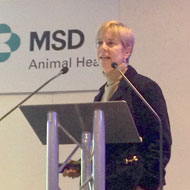Clinical mastitis ain't what it used to be

Professor Pam Ruegg speaking at BCVA Congress.
"Mastitis today ain't your grandfather's mastitis!" said Professor Pam Ruegg from Wisconsin at the beginning of her presentation entitled 'Treatment of clinical mastitis in lactating cows: new bugs, old drugs and changing expectations' at the BCVA Congress in Hinckley.
Shifting patterns of pathogens during the past few decades mean that current control programmes using intramammary antibiotics may not match the reality of cases on farm. So, for instance, Strep agalactiae infections are now very rare, and the treatment of Staph aureus is a minor aspect of its control.
The difficulty is that the occurrence of mastitis is based on detection of inflammation not infection. Twenty-five to 40 per cent of cases are culture negative because the cow's immune system has already dealt with the pathogen.
Few mastitis cases are medical emergencies. With this in mind, it is a good idea to encourage farmers to use a simple three-point case assessment score. On average, 85 per cent of cases can be left until a full assessment has been made of the clinical history of the affected cow and bacterial culture. Most of the 'mild' cases are on the way to getting better anyway and there may be benefits to delaying intramammary infusion and embarking on proper assessment of the cow.
"So can we justify the treatments we use?" asked Prof Ruegg. "The data suggest that in some cases the answer might be 'no'. There is an opportunity to improve our approach. Treatment of cases should be based on the aetiology of the infection and to do this it is useful to have 'on-farm' culture facilities."
Concluding her presentation, Prof Ruegg offered six "take home" points to delegates:
1. Before treatment, check the medical history of the cow. Is she in third lactation or more? There is no evidence that chronic mastitis responds to multiple antibiotic treatments, and in many cases, the milk will return to normal appearance
2. Extended intramammary therapy should be applied to specific cases – only where there is evidence of infection deep in mammary tissue
3. Do not administer antibiotics to cows that do not need it
4. On many farms the use of antibiotics to treat cows with mild E. coli mastitis isn't necessary
5. Develop protocols and monitoring controls
6. Remember, simple symptoms of inflammation do not indicate that antibiotic therapy is necessary. We are always behind the curve and the cow is already trying to cure the infection by the time we see the changes in the milk.



 HMRC has invited feedback to its communications regarding the employment status of locum vets and vet nurses.
HMRC has invited feedback to its communications regarding the employment status of locum vets and vet nurses.